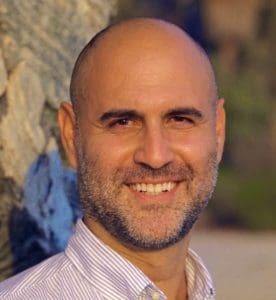Global Learning and Intercultural Dialogue. Member Spotlight: Jeff Katcherian
Jeff Katcherian holds a doctorate in anthropology, a field which propelled his interest in mediation, as it works to form the basis of intercultural understanding and mutual respect. Though he now works in the pet business, he continues to use his communication skills as a manager, often having to facilitate discussions regarding disagreements between employees or customers. Jeff also founded a non-profit to promote intercultural learning, Culture Academy, and hopes to continue his endeavors in this field, as well as expand his work in mediation.
Anthropology as Mediation

Jeff received his doctorate degree in anthropology from the University of California, Irvine. In pursuing this degree, he travelled to Brussels, Belgium – combining his love for Europe with his love for anthropology – to study bureaucrats and how they create law to foster a European identity. Jeff admits that “deep academic anthropology can be very intense and esoteric, I have to admit, but the core of anthropology is so essential no matter what field you’re in,” as it can help provide insight into different cultures, and can be a gateway to understanding and connecting with people who are different from you. The European Union has a different theme each year, the theme happening to be intercultural dialogue the year Jeff was studying in Brussels. His degree involved shadowing different bureaucrats from different nations and attempting to understand how they created law, non-binding international law in particular. Jeff describes anti-Semitism and islamophobia being major points of discussion in Europe during his time there, and these issues continue to pose issues and spark debate worldwide. The bureaucrats Jeff was studying, though, aimed to create spaces in Europe to dialogue about these issues. However, Jeff soon learned that different groups of people had vastly different ways of addressing the problem of creating a European identity, and implementing the idea of unity through diversity. For example, he observed that the Dutch disagreed with the German practice of excluding neo-Nazis from conversations regarding cultural diversity; the Germans believed that these citizens were incorrigible, in a way, while the Dutch believed that excluding them defeated the purpose of the exercise. Though this is just one example, Jeff’s studies in Brussels opened his eyes to how a nation’s history and culture can affect its approach to conflict mediation, and why different people may not always see eye to eye.
Becoming a Manage
After receiving his degree, Jeff began working for his family business, which are all in the pet industry. His father is a veterinarian, and owns a veterinary hospital, a pet cremation business, and a medical waste business. Though vastly different from anthropology, this work involves a great deal of management and communication, which Jeff says makes him “feel like more of an anthropologist working and managing people than I did as an academic. Because as an academic I was kind of surrounded by people that were the same as I was, but here I am really confronted with a lot of people with a lot of different backgrounds and different ways of thinking and being. And I constantly have to readjust and think about how I communicate what I need and understand what they need.” Becoming a manager of people helped spark Jeff’s interest in conflict mediation, as he felt that it would serve him in his work and allow him to better facilitate cooperation between his employees. Since then, he has become more experienced in ensuring effective communication in his workplace, and has discovered the importance of listening. People, he says, often just want to be listened to, and this can sometimes be the entire root of a conflict. Just attempting to listen and mediate “almost in and of itself helps people connect with each other. Even if it doesn’t seem that you get anywhere or it seems that you’re not agreeing, two groups or two people trying to attempt to mediate is sometimes enough.”
MBBI and Gaining Experience
Though Jeff has not been a member of MBBI for very long, he has a drive to become more involved and to learn from other members. Jeff finds mediation theoretically interesting, as communication across cultures relates well to his background in anthropology. Jeff explains that he sees mediation as “everything,” because communication is the backbone of daily life in every context, no matter where you are from. Though he has only ever mediated on small scales, such as between his employees or clients, Jeff says that he has learned a lot and continues to expand his mediation skills. “I think I definitely have gotten better at mediating conflicts. It might not be major international conflicts, but to the business, to my employees, this is important, it’s their livelihood.” He finds it especially rewarding to reach a point where anger dissipates, and people can actually start listening to one another, as this is where progress begins to be made. Along with all of his other accomplishments, Jeff is the founder of the Culture Academy, a non-profit organization that promotes global learning and intercultural dialogue. He is also currently working on starting a program with a former colleague in Brussels that will allow American and European students to embark on virtual exchanges so they can learn about global politics and international issues. Though it is not formal mediation, work like this helps people better understand the world and its various cultures, thus creating a more compassionate and peaceful society. Jeff hopes to become more involved in the field of mediation and MBBI in the near future, and wants to eventually mediate on larger scales.
Article by Tess Hargarten, MBBI Writer
